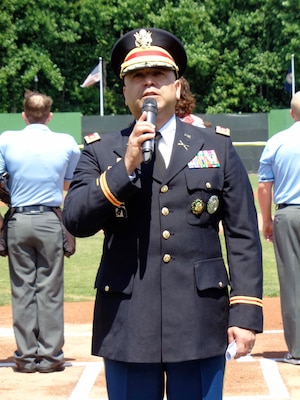By Air Force Tech Sgt. Erich B. Smith National Guard Bureau
ARLINGTON, Va., Aug. 30, 2017 — Army Maj. Edgar I.
Quinones-Marin, a program analyst at the National Guard Bureau, never expected
to be the go-to soldier to sing patriotic songs at events and ceremonies in the
national capital region. But a promotion ceremony more than 10 years ago
started him on that path.
The event's honoree expressed dissatisfaction that the
national anthem at the ceremony would be a recorded version. What he really
wanted was a live performer, said Quinones-Marin, who had a simple suggestion:
"I've sung before in school and church," he said he told the man.
"I can hook you up with that."
With little preparation, he belted out the national anthem,
and word got around that his talent extended past his military role.
Now, Quinones-Marin said, he averages three engagements per
month at locations such as the Pentagon, Arlington National Cemetery, the
National Archives and others.
"The biggest compliment I can get is when people tell
me they get goosebumps when I sing, because they know what the song means, and
they are feeling what I'm feeling when I sing it," he said.
Maintaining Focus
Quinones-Marin credits his ability to focus when singing to
military discipline, as well as to a love for the performing arts he discovered
as a 10-year-old in his native Puerto Rico.
"I sang in a church group with some friends, but
eventually the musical director realized I stood out," he said. A solo
hobby was born, and churches would turn into larger settings, such as the time
he sang "God Bless America" as part of a halftime show at a
Washington Redskins game in September 2015.
Though the venue was larger than anything he had done on a
military installation, Quinones-Marin said, he relies on two methods when
preparing for a performance: warming up the throat muscles and focusing on a
small fraction of the crowd. "You can only see 20 to 25 people when you
are wearing an Army service uniform cap," he explained.
Although singing in a football stadium was a memorable
occasion for him, Quinones-Marin said, a chapel was the location of his most
important performance.
"A chaplain asked me to sing "Amazing Grace"
at Fort Myer's Memorial Chapel for Army Guard and active [component] soldiers
who were killed in Iraq," he said. "It was a moment that I felt I was
really bringing something to the table, trying to let them know how
appreciative we all were for their service."
Spirited Approach
Though he admires a variety of renditions of "The
Star-Spangled Banner," Quinones-Marin said, a soldier must approach the
time-honored national anthem in a spirited, yet conservative way.
"When I sing it, it's simple and to the point," he
said. "It's about the story of a battle, and as soldiers we can pretty
much identify ourselves with what's going on."
Army Sgt. 1st Class Sylvia Bastian, who coordinates protocol
duties for the director of the Army National Guard, said Quinones-Marin is a
huge draw for local promotion and retirement ceremonies in the national capital
region. "He has that presence, that exuberance when he sings," she
said, adding that the Army values of loyalty, duty, respect and honor reflect
in his performances.
Goodwill Ambassador
Quinones-Marin said singing at area events is an extension
of being a goodwill ambassador, and he encourages younger Guard members to find
ways outside of their career fields to represent the National Guard.
"When you're doing what you're getting paid to do, that
is to be expected," he said. "But when you are doing the unexpected,
you're giving a little part of yourself that shows how great it is to be in the
military, as opposed to just saying it."
Quinones-Marin said his calendar is still full, with his most
recent high-profile performance being at a minor league baseball game in
Woodbridge, Virginia. But one more venue, still eludes him, he added: Nationals
Park, home of Major League Baseball's Washington Nationals.
"I was told by my fellow soldiers that you have to go
to the minor league first. If they think you're good, then they'll bring you up
to the majors," he joked.

No comments:
Post a Comment